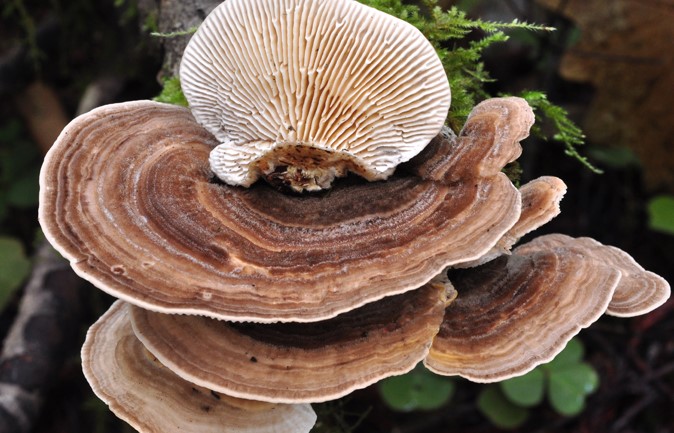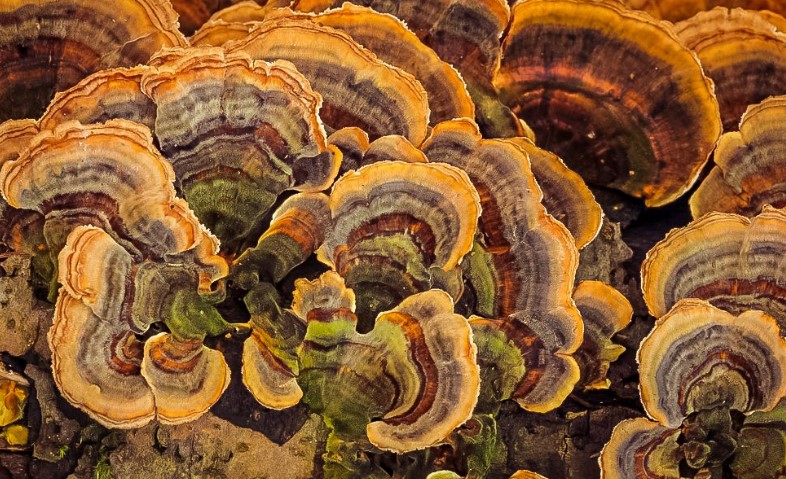Turkey tail mushroom is known to have many health benefits. It contains the active compound PSK, which has been used for decades in Japan for cancer treatment. This substance has relatively few side effects and helps to repair immune cell damage caused by chemotherapy. In six randomized clinical trials of lung cancer patients, PSK therapy significantly improved the quality of life and body weight of patients. Moreover, patients’ immune functions and survival rates also improved. Despite the varying levels of PSK in the mushroom, they seem to be a worthwhile supplement to cancer treatments.
If you’re interested in improving your immune system, see if turkey tail mushrooms are right for you. It is taken by mouth to improve the immune response to cancer medicines and radiation. It is also used for muscle strength, fatigue, UTIs, and many other conditions.

PSP
The PSP in turkey tail mushrooms may improve the immune system and help control inflammation. The prebiotics in these mushrooms nourish the good bacteria in the stomach and maintain the proper balance of intestinal flora. The mushroom also contains antioxidants that protect the body from oxidative stress. Oxidative stress occurs when free radicals and antioxidants interact, causing cellular damage and chronic inflammation. However, this supplement is not for everyone.
The PSP in turkey tail mushrooms has adaptogenic properties. It is similar to the cruise control in your car – the mushroom helps keep the body in a steady state and provides the necessary support for optimal health. The mushrooms are rich in the chemicals that help boost the immune system and maintain its balance. While Western scientists are still exploring the PSP in turkey tail mushrooms, the Asian population has been using this supplement in clinical trials for decades.
PSK is the best-known active compound found in PSP. It has been used in Japan as a cancer treatment for decades with minimal side effects. The mushroom works to strengthen the immune system by repairing the damage to immune cells caused by chemotherapy. Six randomized clinical trials of lung cancer patients showed that PSK improved patients’ immune function and overall health. Moreover, patients undergoing PSK therapy improved their survival rate by up to 33%.
PSK
Studies have shown that PSK or polysaccharide kinase (PSK) from turkey tail mushrooms can modify the human intestinal microbiome and improve gut health. The mushroom has been linked to improved digestion, promoting the growth of good bacteria, and improving immune function. It is also rich in prebiotics, which feed the good bacteria in the gut, promoting a healthy gastrointestinal tract and proper balance of beneficial flora. It also has antioxidant properties, preventing oxidative stress and cellular damage caused by free radicals and other toxins.
Despite the risk of side effects, the benefits of PSK are well worth considering. The compound stimulates the immune response by activating dendritic cells, which are specialized white blood cells that attack and destroy harmful substances in the body. Antioxidants can improve immune function, reduce inflammation, and protect against cancer and other health problems. Additionally, PSK inhibits the growth of human colon cancer cells. These findings suggest that
PSK benefits turkey tail mushrooms for preventing cancer and improving the immune system.
PSK, also known as polysaccharide krestin, has a long history of medicinal use in Asia. Although the PSK benefits of turkey tail mushroom are not widely known in the Western world, it is being researched for clinical use in the U.S. The PSK benefits of turkey tail mushroom are currently being studied in humans, but the research is still preliminary. In Japan, PSK is approved as a treatment for colon cancer, while the compound is not yet FDA-approved for use in the United States. PSK inhibits colon cancer cells from growing and causing damage to healthy cells. The compound is still being studied in humans, but the results are promising.

CVG
According to Dr. Mason Bresett, chief science advisor for the Chinese State Food and Drug Administration, the CVG benefits of turkey tail mushroom are likely to include immune boosting properties. In Asia, the mushroom is used as an anticancer agent because of its ability to improve the immune system. PSK, the active compound in turkey tail mushroom, is a non-specific immunosupportive agent. The mushroom is naturally rich in PSK and is found in high concentrations in organic, pure extracts.
To reap the full benefits of turkey tail mushroom, make sure you choose a supplement derived from the fruiting body. This is the part of the mushroom that has the most beneficial compounds. Other turkey tail mushroom supplements contain mycelium, the root system of the mushroom. This type of mushroom does not have as much beta-glucans as the fruiting body. Also, avoid buying mushroom tinctures that contain mycelium because this is the filler and will not deliver the CVG benefits you’re seeking.
A variety of polysaccharides found in turkey tail mushroom extract are particularly beneficial for enhancing the immune system. Some of the primary compounds include phenolic acids and flavonoids. Among these are the B-1,3, and B-4 glucans. The mushroom also contains polysaccharides, which are a type of protein bound substance. They help support the immune system and reduce fatigue. However, these polysaccharides may also help fight off infections and toxins.
Overall, turkey tail mushroom is a safe supplement for cancer patients that may increase their response to conventional cancer treatments like radiation therapy and chemotherapy. However, there is not enough reliable scientific evidence to support its use for any other condition. Turkey tail mushroom can cause side effects if you take too much, so be sure to follow the dosage instructions on the label.

